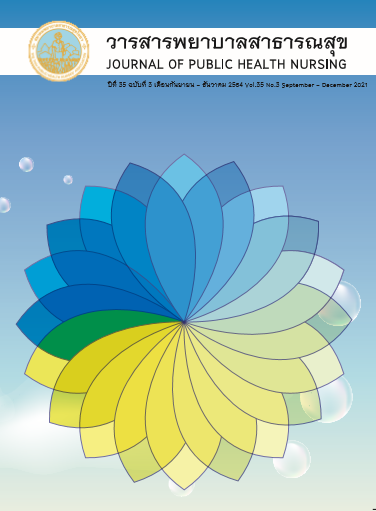Effects of Teaching Using Case - Based Learning Approach on Knowledge and Satisfaction of 4th Year Nursing Students in Nursing Care Pregnant Women with Pre-eclampsia
Keywords:
Case-based learning, Nursing students, Pre- eclampsiaAbstract
Learning management by case-based approach helps learners apply knowledge in nursing process. The objectives of this quasi-experimental research (pre-test and post-test) were to study knowledge and satisfaction on case-based learning of the learners by the case-based approach. The population consisted of 146 nursing students who studied nursing Care of Pregnant Women with Pre-eclampsia. Research tools consisted of lesson plans, case study, examination, questionnaire regarding the opinions of learners and satisfaction on learning management. Data were analyzed by descriptive statistics and t-test.
Learners’ knowledge after learning was higher than the pre- test at .01 level of the statistically significant difference (df=145, t = -67.60). Opinions of the learners on the overall systematical thinking ability was at the high level ( = 3.92, S.D=.56) and satisfaction of learners was at the high level (
= 4.12, S.D=.56). The results of this study showed that the learning management by the case-based approach made the learners achieve a better learning. Therefore, the researchers suggest that there should be an application of this model for teaching and learning management in the nursing field to develop learners’ thinking process continuously.
References
Ministry of Education. Government gazette, the notice of Ministry of Education on bachelor qualification framework of the nursing field [Internet]. 2017 [cited 2021 May 31]. Available from: http://www.mua.go.th/users/tqf-hed/news/data6/98-NQF-2560.pdf
Kunaviktiku W. Teaching and learning in the discipline of nursing in the 21st century. Nurs Res 2015; 42(2): 152-6. (in Thai)
Panit W. Transformative learning. Bangkok: S.R.A. Printing Mass Product Co; 2015.
Poon LC, Shennan A, Hyett JA, Kapur A, Hadar E, Divakar H, et al. The international federation of gynecology and obstetrics (FIGO) initiative on pre-eclampsia: A pragmatic guide for first-trimester screening and prevention. INT J GYNECOL OBSTET 2019; 145(Suppl1): 1–33. Doi: 10.1002/ijgo.12802.
Gestational hypertension and preeclampsia: ACOG practice bulletin, Number 222. Obstet Gynecol 2020; 135(6): e237–e60. Doi: 10.1097/AOG.0000000000003891.
Cunningham FG, Leveno KL, Bloom ST, Spong CY, Dashe JS, Hoffman BL, et al. Hypertensive disorders in pregnancy. 24th ed. Boston: McGraw-H; 2014.
Department of Health, Ministry of Public Health. System of information technology for the support of promotion on health and health environment [Internet]. 2021 [cited 2021 October 20]. Available from: http://dashboard.anamai.moph.go.th/dashboard/mmr/index?year=2021
Chaiyasak M. Research methodology in clinical nursing teaching. Bangkok: The Academic Welfare Project, Praboromarajchanok Institute; 2014.
Learning Management Section, Boromarajchonnani College of Nursing, Bangkok. Learning and teaching management on the case–based learning on professional learning community. Bangkok: Boromarajchonnani College of Nursing, Bangkok; 2018
Srinon R, Srinon U, Yomdit V, Kitnopkiat K. Active learning management in the Era of Thailand 4.0. JOEAS 2019; 9(2): 311-41. (in Thai)
Felder RM, Brent R. Active learning: An introduction. ASQ higher education brief 2009; 2(4): 1-5.
Andreassen HM, Holmsen TL. Case-based learning in nursing education. Nordisk sygeplejeforskning 2018; 8(3): 219-29.
Kaemanee T. Science of teaching: Knowledge body for effective learning process. Bangkok: Chulalongkorn University Publishing; 2007.
Williams B. Case-based learning a review of the literature: Is there scope for this educational paradigm in pre-hospital education? Emerg Med 2005; 22(8): 577-81
Dulayakasem U. Perspectives on lifelong learning in Thai digital community 4.0. Nakorn Pathom: Department of lifelong learning, Faculty of Education, Silapakorn University; 2017.
Kanhadilok S, Malai C, Punsumreang T. A design of case based learning for promoting learning outcomes in practicum. Songklanagarind J Nurs 2019; 39(4): 129-37. (in Thai)
Chaichanawirote U, Vantum C. Evaluation of content validity for research instrument. Journal of Nursing Science & Health 2017); 11(2): 105-11. (in Thai)
Gerawaraong C. Results of teaching and learning management for medical students using the patient as a base. JEDU NU 2011; 13(1): 151-66. (in Thai)
Thomas G. A Typology for the case study in social science following a review of definition discourse and structure. Qual Inq 2011; 17(6): 511-21.
Downloads
Published
How to Cite
Issue
Section
License
บทความที่ตีพิมพ์และแผนภูมิรูปภาพถือเป็นลิขสิทธิ์ของวารสารพยาบาลสาธารณสุข (Thai Public Health Nurses Association)







